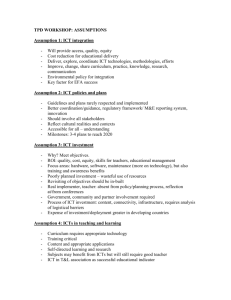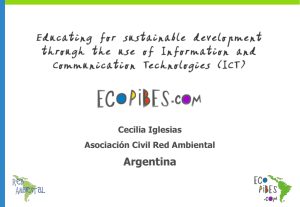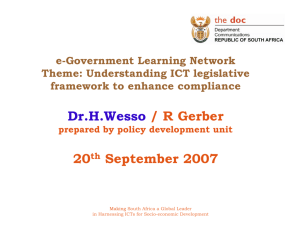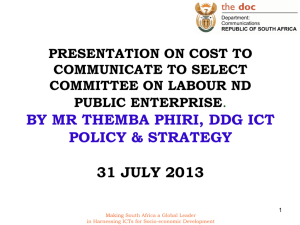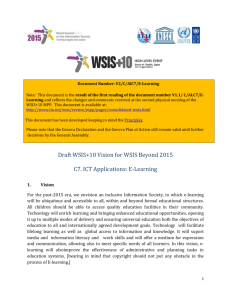information society and development (isad) plan
advertisement
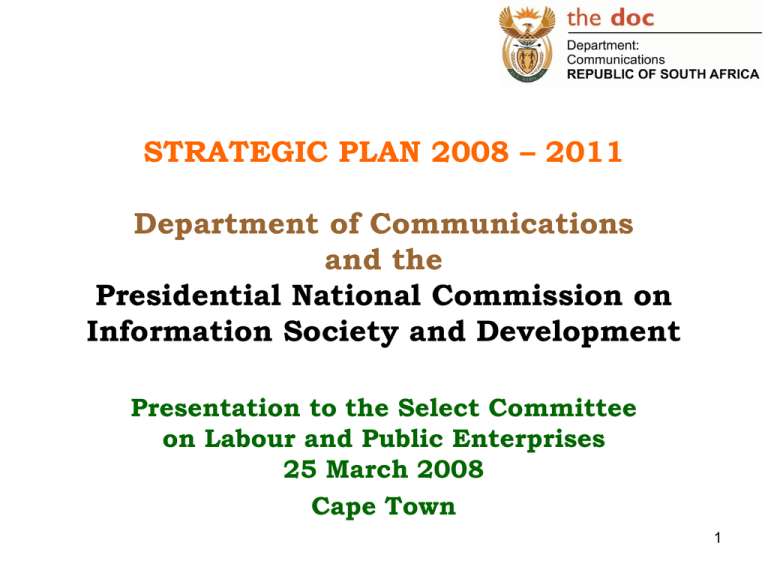
STRATEGIC PLAN 2008 – 2011 Department of Communications and the Presidential National Commission on Information Society and Development Presentation to the Select Committee on Labour and Public Enterprises 25 March 2008 Cape Town 1 LEADERSHIP TEAM Ms. Lyndall Shope-Mafole Director-General (APOLOGIES) Ms. Rosey Sekese DDG: ICT Infrastructure Development Dr. Keith Shongwe DDG: ICT International Affairs & Trade Mr. Harry Mathabathe DDG: Finance & ICT Enterprise Development Ms. Gerda Gräbe COO & DDG: Governance & Administration Mr. Mokwining Nhlapo COO: PNC on ISAD Mr. Norman Munzhelele Acting DDG: Policy Development Making South Africa a Global Leader in Harnessing ICTs for Socio-economic Development 2 STRATEGIC SUPPORT TEAM Ms. M Mphahlele CD: Office of the DG Ms. P Linders CD: Gender, Disability, Youth & Children, Office of the DG Mr. Farhad Osman CD: Strategic Planning & Monitoring Mr. Albi Modise Acting CD: Marketing & Communications Making South Africa a Global Leader in Harnessing ICTs for Socio-economic Development 3 INTRODUCTION The DoC 2008-2011 Strategic Plan is presented within the context of “business unusual” The period from 2008 to 2011 will see rapid developments in the ICT sector, which will benefit all South Africans in the long-term Just like last year, the Plan is based on and aligned to following five Key Focus Areas (KFAs) of the Government Achieving higher rates of investment in the economy Increasing competitiveness of the SA economy Broadening the participation in the economy Improving capacity of the State capacity to deliver Contributing to a better world Making South Africa a Global Leader in Harnessing ICTs for Socio-economic Development 4 MANDATE OF THE DoC TO PROVIDE FOR THE DEVELOPMENT OF ROBUST, RELIABLE, AFFORDABLE AND SECURED ICT INFRASTRUCTURE WHICH ENABLES THE DELIVERY OF A MULTIPLICITY OF APPLICATIONS AND SERVICES Making South Africa a Global Leader in Harnessing ICTs for Socio-economic Development 5 MANDATE OF PNC To advise the President on: The use of ICTs to optimise the pace and the extent of addressing South Africa’s development challenges and enhancing South Africa’s global competitiveness South Africa’s contribution to and benefit from the development of an inclusive Information Society in Africa and the world To facilitate the coordinated and integrated development of an inclusive Information Society in South Africa To support efforts aimed at making South Africa and Africa integral and equal members of the Global Information Society Leaders on theMaking Development of an inclusive Information Society South Africa a Global Leader in Harnessing ICTs for Socio-economic Development 6 DOC MEDIUM TERM STRATEGY MAP KFA 1: ACHIEVING HIGHER RATES OF INVESTMENT IN THE ECONOMY SG 1.1: Enable the maximization of investment in the ICT sector KFA 2: INCREASING COMPETITIVENESS OF THE SA ECONOMY SG 2.1: Ensure that ICT infrastructure is robust, reliable, affordable and secured to meet the needs of the country and its people KFA 3: BROADENING THE PARTICIPATION IN THE ECONOMY SG 3.1: Accelerate the socio-economic development of South Africans by increasing access to, as well as the uptake and usage of, ICTs through partnerships with business and civil society KFA 4: IMPROVING CAPACITY OF THE STATE TO DELIVER KFA 5: CONTRIBUTE TO BUILDING A BETTER WORLD SG 4.1: Build an effective information-age organisation that contributes to the effective functioning of the FOSAD Cluster and to contribute to building a Single Public Service SG 4.2: Enhance the role of ICT SOE’s as the delivery arms of government SG 5.1: Contribute to the building of an inclusive Information Society globally, prioritising Africa’s development Making South Africa a Global Leader in Harnessing ICTs for Socio-economic Development 7 PNC MEDIUM TERM STRATEGY MAP KFA 1: ACHIEVING HIGHER RATES OF INVESTMENT IN THE ECONOMY SG 1.1: ISAD Plan finds expression in the NSDP’s, PGDS’s & IDP’s KFA 2: INCREASING COMPETITIVENESS OF THE SA ECONOMY SG 2.1: Establish SA as an advanced information Society KFA 3: BROADENING THE PARTICIPATION IN THE ECONOMY SG 3.1: Improved quality of life of the poor by prioritising the second economy interventions in the building of the Information Society KFA 4: IMPROVING CAPACITY OF THE STATE TO DELIVER KFA 5: CONTRIBUTE TO BUILDING A BETTER WORLD SG 2.1: Information Society enabled youth SG 4.1: Integrated and coordinated building of the information society and accelerated and improved service delivery SG 4.2: PNC on ISAD – a hub of government machinery for the development of Information Society SG 5.1: Initiate efforts in making South Africa & Africa an integral and equal member of the global information society Leaders on theMaking Development of an inclusive Information Society South Africa a Global Leader in Harnessing ICTs for Socio-economic Development 8 8 DoC PRIORITIES FOR 2008/09 1. Implement Phase One (233 Dinaledi Schools) of Wireless Broadband Infrastructure by Sentech (APEX Project), 2. Commence construction of joint UHURUnet/Infraco submarine cable-the biggest such project in Africa’s history 3. Develop a Programme of Action to benchmark telecommunications costs, quality, availability, accessibility and usage in South Africa with comparator countries (Brazil, Chile, India, Malaysia, South Korea) 4. Complete Phase One of the roll out of new digital-ready transmitters by Sentech to cover 50 % of population 5. Accelerate the building of the South African Set Top Box manufacturing industry Making South Africa a Global Leader in Harnessing ICTs for Socio-economic Development 9 …DoC PRIORITIES FOR 2008/09 6. Develop Radio Frequency Spectrum Usage Policies in line with World Radio Conference-07 outcomes and taking into account the Frequency Plan developed by ICASA 7. Contribute to combating crime through the provision by SAPO of an address identification system in the areas around the 169 Priority Police Stations 8. Commence the construction process of the second Sentech teleport as part of meeting our FIFA 2010 World Cup guarantees 9. Increase universal access to government information and services through building Thusong Post Offices in 100 communities led by SAPO, using the EPWP 10. Reach employment Equity of 50% female representativity at SMS level and exceed the target of 2% representation of people with disabilities at all levels Making South Africa a Global Leader in Harnessing ICTs for Socio-economic Development 10 SUMMARY OF DOC APPROVED STRUCTURE The Doc has performed well with respect to meeting the Cabinet targets of 50% women at SMS levels and 2% people with disability across all levels We aim to exceed these targets during this financial year. This table also shows that, contrary to press reports, the DOC does not have a high vacancy rate The structure with an increased size was only approved this year. Of the new positions, only 50 will have funding and will be filled by June TOTAL POSITIONS IN THE APPROVED STRUCTURE FILLED POSITIONS VACANT POSITIONS FUNDED VACANT POSITIONS TO BE FILLED 2008/09 UNFUNDED POSITIONS 428 287 141 50 91 ICT PROJECTS IN PROVINCES SCHOOL CYBERLABS (Total: 244) EC GT FS KZN LP MP NC NW WC 43 6 17 44 36 36 23 29 10 TELECENTRES (Total: 154) EC GT 18 19 (1 Digital hub) FS 18 (1 Digital hub) KZN LP MP NC NW WC 23 31 15 9 18 10 (1 Digital hub) Underserviced Area Licences (USALS) (Total: 7) EC FS 2 1 KZN 2 LP NW 1 1 Making South Africa a Global Leader in Harnessing ICTs for Socio-economic Development 12 ICT PROJECTS IN PROVINCES REQUESTED MUNICIPAL WEBSITES (Total: 4) FS KZN 1 1 LP MP 1 1 COMMUNITY RADIO STATIONS (Total: 100) EC GT FS KZN LP MP NC NW WC 11 15 11 16 12 (13 on air) (10 on air) (10 on air) 15 6 6 8 (3 on air) (5 on air) (8 on air) (8 on air) (9 on air) (11 on air) Making South Africa a Global Leader in Harnessing ICTs for Socio-economic Development 13 INFORMATION SOCIETY AND DEVELOPMENT (ISAD) PLAN Early 2007 the Cabinet approved the national ISAD Plan for building an inclusive Information Society The Cabinet established the following ISAD implementation mechanisms: The Ministerial Committee on the Information Society and Development with its corresponding FOSAD ISAD Cluster The ISAD Inter-Governmental Relations Forum with its corresponding ISAD Technical Support Committee 14 Leaders on the Development of an inclusive Information Society PNC PRIORITIES FOR 2008 -APEX PRIORITY PROJECT1. Increase uptake and usage of ICTs by deploying ICT equipment in 233 Dinaledi Schools as well as clinics, libraries, heritage sites and government offices in coverage area of the schools 2. As a national identity and social cohesion contribution: Have young people interview senior citizens over the age of 65 to collect historical account of their lives and develop websites for and with the with House of Traditional Leaders at National and Provincial spheres 3. As our NYS contribution: Deploy e-Cadres to support teaching in schools, assist with data collection in health centres, assist with information gathering in libraries and assist the public to access information and services in Post Office 4. As a youth development and job creation initiative: use e-Cooperatives to develop websites for the National & Provincial Houses of Traditional leaders and Municipal offices upscale the number of e-Cooperatives from the current 46 Making South Africa a Global Leader Leaders the Development an inclusive Information Society in on Harnessing ICTs for of Socio-economic Development 15 APEX PROJECT 3: Implementing the ISAD Plan and increasing uptake and usage of ICTs by government and individuals Apex Project 3 is one of the 24 Apex of priorities announced by the President in the State of the Nation to be completed by the end of the term of the current government The project is built around the provision of connectivity to the Dinaledi Schools through Sentech Wireless Broadband Network There are 30 sub-projects to be implemented in the coverage area of the Dinaledi School network With R500 million allocated, to Sentech, 150 base stations which can cover around 233 Dinaledi Schools, will be procured The ISAD Cluster has requested all provincial representatives to identify the schools where the roll-out will be prioritised Therefore the selection of the initial 233 Dinaledi Schools to be connected should be governed by: High impact on poverty eradication Large numbers of students to benefit Large numbers of related sites (post office, Thusong Service centre, library, clinic, police station etc) in the coverage area of the school Making South Africa a Global Leader Leaders the Development an inclusive Information Society in on Harnessing ICTs for of Socio-economic Development 16 …APEX PROJECT 3 In line with the high impact criteria the following break down was discussed as the minimum number of schools per province Eastern Cape - 40 (out of 60 Dinaledi schools) Free State - 20 (out of 35 Dinaledi schools) Gauteng - 25 (out of 101 Dinaledi schools) Kwa-Zulu Natal - 40 (out of 84 Dinaledi schools) Limpopo - 35 (out of 51 Dinaledi schools) Mpumalanga - 25 (out of 44 Dinaledi schools) Northern Cape - 17 (out of 17 Dinaledi schools) North-West - 20 (out of 51 Dinaledi schools) Western Cape - 20 (out of 45 Dinaledi schools) Provinces that are geographically smaller will automatically have more coverage Making South Africa a Global Leader Leaders the Development an inclusive Information Society in on Harnessing ICTs for of Socio-economic Development 17 MTEF BASELINE ALLOCATION 2008/09 - 2010/11 PROGRAMME 2007/08 2008/09 % 2009/10 2010/11 Administration 141 367 146 810 9% 155 504 163 380 ICT International Affairs and Trade 34 190 41 249 2% 46 904 49 932 ICT Policy Dev. 86 832 91 992 5% 95 670 180 124 ICT Enterprise Dev. 10 308 - ops 1 557 878 Transfers 17 706 1% 19 425 15 919 1 303 760 76% 1 253 859 1 219 229 ICT Infrastructure Development 65 762 90 476 5% 100 620 108 732 Presidential National Commission 28 146 31 612 2% 34 660 36 623 TOTAL 1 924 483 1 723 605 100% 1 706 642 1 773 939 Making South Africa a Global Leader in Harnessing ICTs for Socio-economic Development 18 ANALYSIS OF ALLOCATION BETWEEN 2007/08 AND 2008/09 PROGRAMME 2007/08 2008/09 INCREASE/ DECREASE Administration 141 367 146 810 5 443 The increase is due to the normal inflation rate ICT Internat. Affairs and Trade 34 190 41 249 7 059 The increase is due to the normal inflation rate ICT Policy Dev. 86 832 91 992 5 160 The increase is due to the normal inflation rate ICT Enterprise Dev. -ops -Transfers 10 308 17 706 7 398 The increase is due to the normal inflation rate 1 557 878 1 303 760 (254 118) The decrease is due to the R500 million to Sentech : NBWN which was received during the adjustment estimates and for the 2008/09 financial year R200 m to Sentech: 2010 and R32 million for DTT. ICT Infrastructure Development 65 762 90 476 24 714 The significant increase is due to the funding to requisite ICT-related infrastructure projects associated with the hosting of the 2010 FIFA world Cup. Presidential National Commission 28 146 31 612 3 466 1 924 483 1 723 605 (200 878) Total The increase is due to the normal inflation rate. Making South Africa a Global Leader in Harnessing ICTs for Socio-economic Development 19 MTEF BASELINE ALLOCATION – ECONOMIC CLASSIFICATION ECONOMIC CLASSIFICATION Current Payments 2008/09 R’000 363 814 Transfers and Subsidies - Public Entities - Other Payments for Capital Assets TOTAL % 21.1% 2009/10 R’000 394 299 2010/11 R’000 421 417 1 303 760 75.6% 1 253 859 1 219 229 47 873 2.8% 49 401 123 675 8 158 .5% 9 083 9 618 1 723 605 100 1 706 642 1 773 939 Making South Africa a Global Leader in Harnessing ICTs for Socio-economic Development 20 BASELINE ALLOCATION 2008/09 TRANSFERS 12,060 22,30434,581 217,866 USAASA 247,272 USF ICASA 12,060 NEMISA NEPAD eAfrica Commission SABC: Channel Africa 25,303 2,500 200,000 34,834 SAPO African Advanced Institute for ICT SENTECH Programme Production SENTECH: 2010FIFA WORLD CUP Community Radio Stations SABC: Public Broadcaster 25,000 Community Radio Stations 150,000 371,600 6,000 Making South Africa a Global Leader in Harnessing ICTs for Socio-economic Development 21 THANK YOU Making South Africa a Global Leader in Harnessing ICTs for Socio-economic Development 22 Additional information Making South Africa a Global Leader in Harnessing ICTs for Socio-economic Development 23 DOC MEDIUM TERM STRATEGY MAP KFA 1: ACHIEVING HIGHER RATES OF INVESTMENT IN THE ECONOMY KFA 2: INCREASING COMPETITIVEN ESS OF THE SA ECONOMY SG 1.1: sector Enable the maximization of investment in the ICT SO 1.1.1: Contribute to creating conditions for an accelerated and shared growth of the South African economy through the development and implementation of ICT policies and strategies that positively impacts on the wellbeing of al our people SG 2.1: Ensure that ICT infrastructure is robust, reliable, affordable and secured to meet the needs of the country and its people SO 2.1.1: Support and enable the provision of a multiplicity of ICT applications and services through facilitating the modernization of the infrastructure SO 2.1.2: Contribute to an increase in access to ICTs through contributing to reducing the cost to communicate Making South Africa a Global Leader in Harnessing ICTs for Socio-economic Development 24 DOC MEDIUM TERM STRATEGY MAP KFA 3: BROADENING THE PARTICIPATION IN THE ECONOMY SG 3.1: Accelerate the socio-economic development of South Africans by increasing access to, as well as the uptake and usage of, ICTs through partnerships with business and civil society SO 3.1.1: Contribute to increasing the ICT skills base in South Africa and increase access to, and uptake and usage of ICTs SO 3.1.2: Facilitate the growth and development of SMMEs as well as improve their sustainability through the use of ICTs Making South Africa a Global Leader in Harnessing ICTs for Socio-economic Development 25 DOC MEDIUM TERM STRATEGY MAP SG 4.1: Build an effective information-age organisation that contributes to the effective functioning of the FOSAD Cluster and to contribute to building a Single Public Service KFA 4: IMPROVING CAPACITY OF THE STATE TO DELIVER SO 4.1.1: Ensure the optimal functioning of the DoC through building an efficient and effective leadership cadre for the developmental State and through integrating and aligning operational processes and systems SO 4.1.2: Ensure compliance with the Employment Act and Cabinet directives SO 4.1.3: Ensure compliance with Batho Pele SG 4.2: Enhance the role of ICT SOE’s as the delivery arms of government SO 4.2.1: Provide efficient and effective oversight support to SOE’s and other entities to ensure sustainability Making South Africa a Global Leader in Harnessing ICTs for Socio-economic Development 26 DOC MEDIUM TERM STRATEGY MAP SG 5.1: Contribute to the building of an inclusive Information Society globally, prioritising Africa’s development KFA 5: CONTRIBUTE TO BUILDING A BETTER WORLD SO 5.1.1: Strengthen South-South Cooperation to support economic development SO 5.1.2: Support the African Agenda through active participation and implementation of African ICT programmes, in order to promote development in Africa SO 4.1.3: Transform the ICT Institutions of global governance, influence the global agenda and implement outcomes of major Summits as part of the developmental agenda Making South Africa a Global Leader in Harnessing ICTs for Socio-economic Development 27 PNC MEDIUM TERM STRATEGY MAP KFA 1: ACHIEVING HIGHER RATES OF INVESTMENT IN THE ECONOMY SG 1.1: ISAD Plan finds expression in the NSDP’s, PGDS’s & IDP’s SO 1.1.1: Leverage political leadership through the ISAD Institutional Mechanism i.e. Inter-Ministerial Mechanism Committee on ISAD & ISAD IGRF SG 2.1: Establish SA as an advanced information Society KFA 2: INCREASING COMPETITIVENESS OF THE SA ECONOMY SO 2.1.1: Prioritise research & development, innovation and skills development in building a safe, secure and inclusive Information Society SG 2.2: Information Society enabled youth SO 2.2.2: Focus on youth, and ensure their active participation in information society Programmes Leaders on theMaking Development of an inclusive Information Society South Africa a Global Leader in Harnessing ICTs for Socio-economic Development 28 28 PNC MEDIUM TERM STRATEGY MAP KFA 3: SG 3.1: Improved quality of life of the poor by prioritising the second economy interventions in the building of the Information Society BROADENING THE PARTICIPATION IN THE ECONOMY SO 3.1.1: Increased uptake and usage of ICT’s by SMME’s , women, youth, people with disability, the non-formal sector and the development of ICT SMME’s Leaders on theMaking Development of an inclusive Information Society South Africa a Global Leader in Harnessing ICTs for Socio-economic Development 29 29 PNC MEDIUM TERM STRATEGY MAP KFA 4: IMPROVING CAPACITY OF THE STATE TO DELIVER KFA 5: CONTRIBUTE TO BUILDING A BETTER WORLD SG 4.1: Integrated and coordinated building of the information society and accelerated and improved service delivery SO 4.1.1: Effective functioning of the FOSAD ISAD Cluster and IGRF Technical Committee SG 4.2: PNC on ISAD – a hub of government machinery for the development of Information Society SO 4.2.1: PNC on ISAD as a model knowledge driven organization SG 5.1: Initiate efforts in making South Africa & Africa an integral and equal member of the global information society SO 5.1.1: Facilitate the sharing of experience and expertise in achieving an Inclusive Information Society, prioritising the Region, Continent and South Africa Making South Africa a Global Leader in on Harnessing ICTs for of Socio-economic Development Leaders the Development an inclusive Information Society 30 THE ISAD INTERMINISTERIAL COMMITTEE The Inter-Ministerial Committee, Co-Chaired by the Ministers of Communications and Arts and Culture is due to meet The ISAD Cluster, Co-Chaired by the DGs of Communications and Arts and Culture has held six meetings. It has 8 sub-committees chaired by the DGs of Communications, Arts and Culture, Education, Health, Public Service and Administration, Home Affairs, Science and Technology and Trade and Industry DGs from Provinces, SALGA and the House of Traditional Leaders participate in the Cluster INTERGOVERNMENTAL RELATIONS FORUM (1) The Intergovernmental Relations Framework Act No 13 of 2005 encourages Cabinet Members to establish a national intergovernmental relations forum to facilitate and promote policy and related matters in their functional areas. The ISAD IGR Forum has been launched on 12 December 2006. The objectives of the Forum are to: Serve as a consultative Forum with respect to ICT matters across all three spheres of government and industry; Facilitate the building of an inclusive Information Society across all spheres of government in an integrated and coordinated manner; and Contribute to the development of ICT policies, programs and the coordinated implementation of initiatives so as to increase the impact of ICTs in support of more effective, efficient and timely service delivery. Making South Africa a Global Leader in on Harnessing ICTs for of Socio-economic Development Leaders the Development an inclusive Information Society 32 32 INTERGOVERNMENTAL RELATIONS FORUM (2) In accordance with Section 10(1) of the Act the membership of the ISAD IGR Forum on ICTs consists of the following 23 permanent members: Minister of Communications (Chairperson) Minister of Public Service & Administration (1st Deputy Chairperson) Deputy Minister of Communications (2nd Deputy Chairperson) 18 MECs (two MECs per Province dealing with economic and another socio-economic matters Chairperson of SALGA Chairperson of The National House of Traditional Leaders Invited persons Making South Africa a Global Leader Leaders the Development an inclusive Information Society in on Harnessing ICTs for of Socio-economic Development 33 INFORMATION SOCIETY AND DEVELOPMENT (ISAD) PLAN The Ministerial ISAD Committee IS DUE TO MEET. The FOSAD ISAD Cluster has held two workshops and six meetings. It meets once a month. The ISAD Inter-Governmental Relations Forum meets twice per annum. It has held four meetings in the following provinces; Gauteng, the innaugural meeting, Free State Mpumalanga and the next meeting will be in North West. 34 Leaders on the Development of an inclusive Information Society
